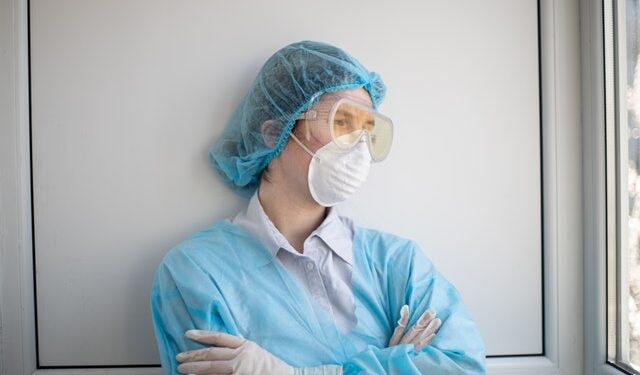
The COVID-19 pandemic has taken its toll in many ways, including affecting physician burnout. Not just on those who have died and their loved ones, but on the carers, too. Unsurprisingly, the pandemic-induced overwhelming demand for healthcare in a healthcare system already under immense strain has affected us all. In this article, we illustrate how physician burnout and COVID-19 are now inextricably linked as we learn to live with SARS-Cov-19.
Before the pandemic hit, physicians were already under significant stress. Record levels of burnout, mental illness, addiction, and suicide were hitting us from all sides. We were reluctant to seek help, and we were dropping out or dropping dead. Physician wellbeing has been double-punched by the COVID-19 pandemic against a background of immorally high levels of physician distress.
Back in January 2020 when the first reports of a strange new virus started emerging, it was hard to imagine how hugely the world has changed in two years. Working from home has become the norm for many, international travel has been hard hit, industries have collapsed and others blossomed.
One thing that has not changed is the need for doctors, nurses, PAs, porters, and cleaners to come into the hospital.
In early 2020, physicians were faced with an unknown pathogen with no credible treatments or vaccinations, against a backdrop of countrywide lockdowns and distress, separation from loved ones, and escalating demand for services.
Working from home has become the norm for many... One thing that has not changed is the need for doctors, nurses, PAs, porters, and cleaners to come into the hospital.
The images of queuing ambulances outside hospitals and later mass graves in places like New York seemed entirely impossible, yet they happened in countries with well-resourced healthcare systems. The patient casualties started mounting up, and then the staff casualties did too.
We lost too many carers. Some even ended their own lives amidst the chaos for reasons we can only guess at, but where burnout, moral distress, untreated mental illness, and a lack of systemic support for the carers are the most likely explanations.
Physicians in early COVID-19 hot spots had to work a huge number of hours while also stressing about the early shortage of personal protective equipment, contracting SARS-CoV-2 themselves, separated from their families, concern for their loved ones getting a potentially fatal disease, and a lack of knowledge about the best course of treatment for patients with COVID-19.
In fact, healthcare workers seemed to experience higher levels of distress when working with COVID-19 patients. They showed significantly more severe moral distress, anxiety, and depression symptoms and mental disorders, compared to healthcare workers who were not working with COVID-19 patients.
Then those in early COVID hotspots had to defer elective care to deal with COVID. These elective cases did not magically go away, and demand continued to accumulate over time. For conscientious, caring individuals, it was awful, and we are still feeling the aftershocks.
Those in early COVID hotspots had to defer elective care to deal with COVID. These elective cases did not magically go away, and demand continued to accumulate over time. For conscientious, caring individuals, it was awful.
While pre-COVID physician burnout levels were already high – 43% in 2019 according to Medscape – these appear to have worsened since, with nearly 48-50% reporting burnout in mid-2020.
This figure came from a study published in the Lancet which surveyed over 20,000 healthcare workers, finding that 61% reported fear of exposure or transmission, 38% reported anxiety/depression, 43% suffered work overload, and 49% had burnout. Physicians were not alone in feeling distress: Stress scores were highest among nursing assistants, medical assistants, and social workers. Women and persons of color had higher stress scores. Unsurprisingly, stress was related to workload and mental health and was lower when staff felt valued by their organizations.
Over the border in Canada, before the pandemic, some 66% of Ontario physicians reported some level of burnout in March 2020, of which 29% confirmed persistent symptoms. One year later, 72% of physicians reported burnout, with 35% revealing persistent symptoms (Ontario Medical Association, 2021). Additionally, in a recent UBC study examining burnout among Vancouver internal medicine physicians, the prevalence reported was generally higher than similar evaluations conducted pre-pandemic.
It’s hard to imagine that there might be a silver lining to all this chaos and physician burnout. But we think there could be one.
In the two-plus years since the pandemic, we have made incredible progress: we now have reasonable treatments and a wealth of experience in reducing COVID-related mortality. We have excellent vaccines, detailed knowledge of our viral enemy and its various mutations, and an understanding that we will likely have to live with COVID as we do with annual influenza. We also have an emerging understanding of the neuropsychiatric effects of COVID and its manifestations, including a “long COVID” syndrome.
Despite the negatives, the same Lancet survey found that 46% of doctors had an enhanced sense of meaning and purpose during the pandemic, and more than half felt valued by their organization. There is the possibility of post-traumatic growth. There is increased recognition of the importance of healthcare workers, and of clinicians as human beings. Organizations have had to make efforts to look after their staff better. Many more hospitals have systems in place to support their valued clinicians. The AMA and other physician groups have since developed a number of tools for enhancing pandemic resiliency.
Humanizing modern medicine may well be an unexpected side effect of the COVID-19 pandemic. Only time will tell whether burnout levels will reduce as the pandemic settles. We sincerely hope that medical leadership and healthcare organizations have started to see the value of their physicians and are using evidence-based approaches to tackle the systemic causes of burnout.
